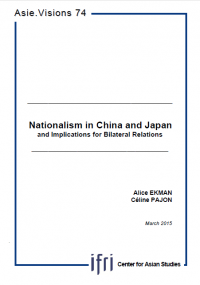Gateway to Think Tanks
| 来源类型 | Publications - Policy Papers - Asie Visions |
| 规范类型 | 简报 |
| DOI | 978-2-36567-368-6 |
| Nationalism in China and Japan and Implications for Bilateral Relations Asie.Visions, No. 74, March 2015 | |
| Alice EKMAN; , Céline PAJON | |
| 发表日期 | 2015-03-27 |
| 出处 | Asie Visions |
| 出版年 | 2015 |
| 概述 | Nationalism appears to be an important part of the growing frictions between China and Japan. ... |
| 摘要 |
Nationalism in China and Japan and Implications for Bilateral Relations Asie.Visions, No. 74, March 2015
Nationalism appears to be an important part of the growing frictions between China and Japan. In Japan, the return to power of Shinzo Abe as prime minister, and the historic breakthrough of an extreme right-wing party onto the political scene reinforce the view that there has been a clear shift to the right. Public opinion is today also more realistic about direct security threats to Japan.  However, this rise in neo-nationalism, which contains a clear anti-Chinese strain, should not be caricatured as aggressive militarism. Furthermore, it is strongly contained by democratic safeguards. In China, the new leadership headed by Xi Jinping has promoted patriotic and nationalist ideas even more strongly than its predecessors, while still concentrating on the traditional aims of economic development and stability. Under these circumstances, the exploitation of anti-Japanese nationalism by the Party should not be overestimated: it is tolerated to a certain degree, but controlled and even repressed as soon as it risks getting out of hand. Nationalism is thus one aspect, among others, of Chinese and Japanese foreign policy. Other key factors need to be taken into account, which may either moderate or exacerbate it. Measures controlling nationalism are in place, though they have shown themselves to be moderately effective in the face of the radicalization and sharpened sensitivity of public opinion. The acceleration of phases of nationalism along with provocations is coalescing with increasingly antagonistic views so as to reinforce security dilemmas. In fact, tensions today appear to be so strong that they have reached a point of no return. This makes it impossible to restore the status quo ante or to establish some form of reconciliation on new grounds. Alice Ekman is a research fellow at the Center of Asian Studies (Ifri), and a China specialist. She is also teaching at Sciences Po Paris. Céline Pajon is a research fellow at the Center of Asian Studies (Ifri), and a Japan specialist.
Nationalism in China and Japan and Implications for Bilateral Relations
|
| 关键词 | bilateral relations Nationalism Asia China Japan |
| URL | https://www.ifri.org/en/publications/enotes/asie-visions/nationalism-china-and-japan-and-implications-bilateral-relations |
| 来源智库 | French Institute of International Relations (France) |
| 引用统计 | |
| 资源类型 | 智库出版物 |
| 条目标识符 | http://119.78.100.153/handle/2XGU8XDN/415956 |
| 推荐引用方式 GB/T 7714 | Alice EKMAN,, Céline PAJON. Nationalism in China and Japan and Implications for Bilateral Relations Asie.Visions, No. 74, March 2015. 2015. |
| 条目包含的文件 | ||||||
| 文件名称/大小 | 资源类型 | 版本类型 | 开放类型 | 使用许可 | ||
| av74.png(29KB) | 智库出版物 | 限制开放 | CC BY-NC-SA |  浏览 | ||
| av74_ekman_pajon_nat(955KB) | 智库出版物 | 限制开放 | CC BY-NC-SA | 浏览 | ||
除非特别说明,本系统中所有内容都受版权保护,并保留所有权利。